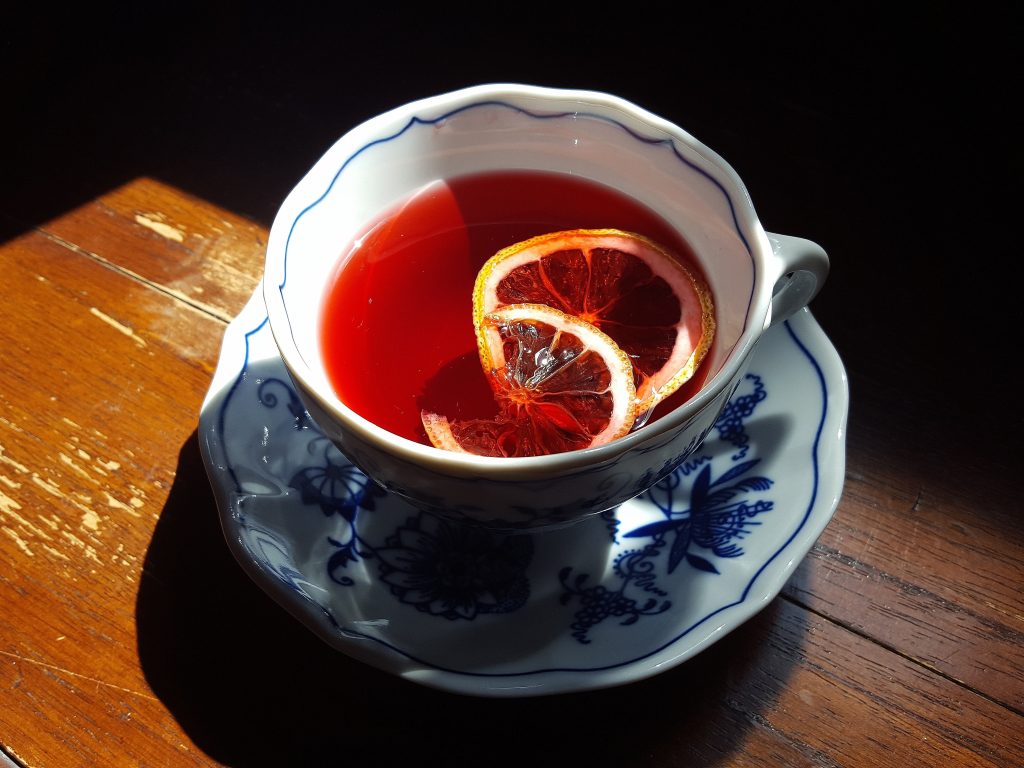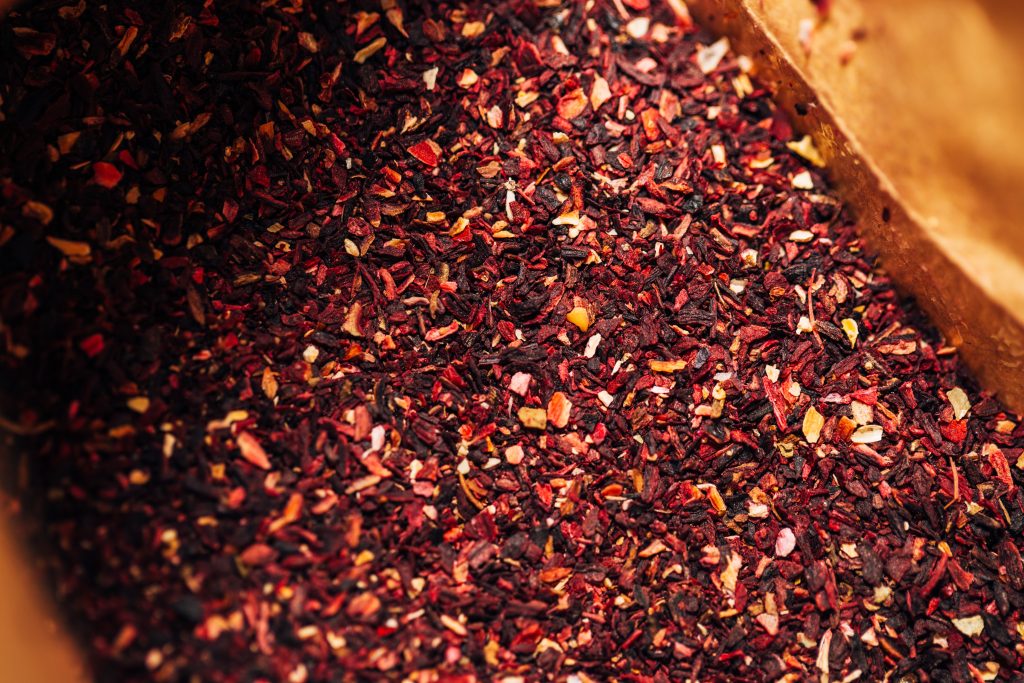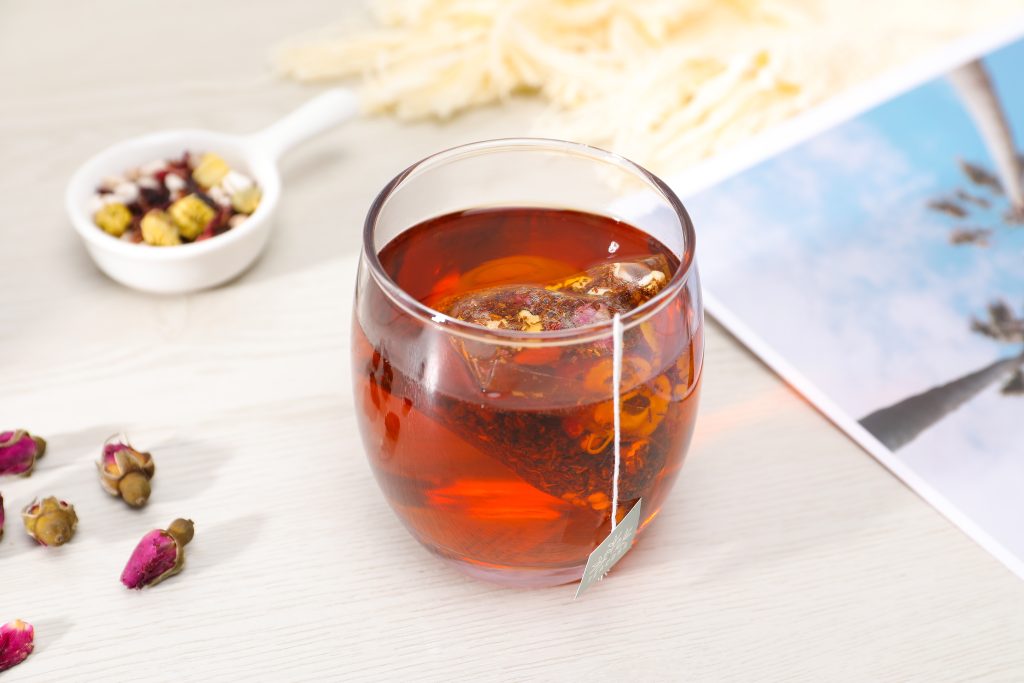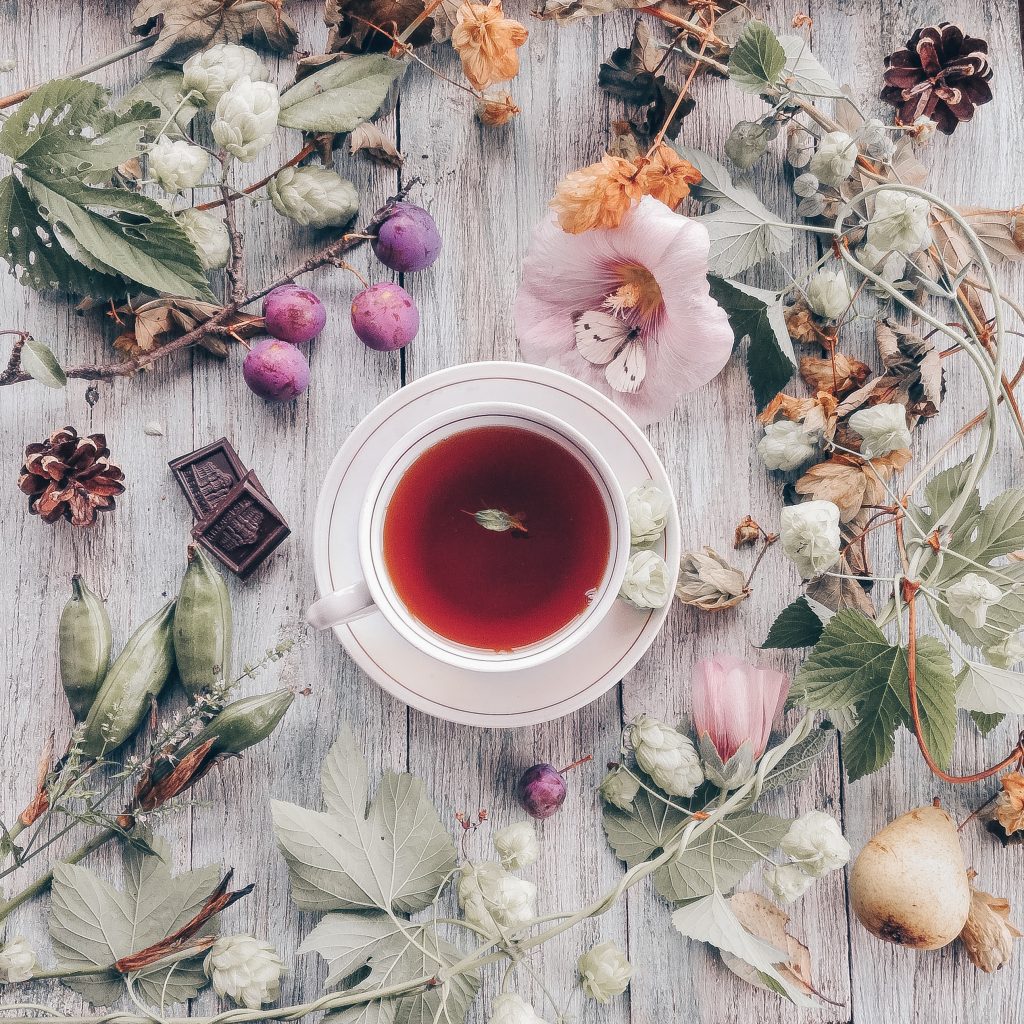Hibiscus Tea Benefits – This tea is more than a thirst-quenching brew!

Photo by Tea Creative │ Soo Chung on Unsplash
Hibiscus tea benefits, well known in traditional medicine for many years, range from its potent antioxidants to its ability to lower blood pressure.
Hibiscus tea is an herbal tisane, one of many herbal teas enjoyed worldwide, made from the dried, vibrantly coloured calyces of the hibiscus flower. The hibiscus is a flowering plant notable for its large, colorful flowers and is commonly found in tropical climates (learn more about the hibiscus flower and hibiscus tea here).
Served hot or chilled and enjoyed by many people worldwide, this tea can be consumed hot for optimal flavor or served cold, making it a versatile beverage. It is good for health, and current research targeting the potential health benefits of hibiscus tea supports the age-old wisdom about this fragrant tart beverage.
Here are some ways herbal teas like hibiscus and licorice root tea are good for our health and wellness.
History and Cultural Significance

Hibiscus tea has a fascinating history that spans continents and cultures, making it much more than just a refreshing beverage. The hibiscus plant, especially Hibiscus sabdariffa, has been cherished for centuries in traditional medicine and daily life. In Africa, drinking hibiscus tea—often called “sour tea”—is a beloved ritual, valued for its ability to help lower blood pressure and support digestion. Across the Atlantic in Mexico, hibiscus tea is known as “Agua de Jamaica,” a festive drink enjoyed during holidays and family gatherings for its vibrant color and tart flavor.
The hibiscus plant also holds a special place in Indian and Chinese traditional medicine, where it’s used to address a variety of health concerns, from high blood pressure and fever to digestive issues. Today, the global popularity of hibiscus tea continues to grow, as more people discover its many health benefits, including weight loss, improved immune function, and a reduced risk of chronic diseases. Whether enjoyed hot or cold, drinking hibiscus tea connects us to a rich tapestry of cultural traditions and the ongoing pursuit of wellness.
Hibiscus Tea Benefits for Blood Pressure
High blood pressure (BP), which increases the risk of heart disease, stroke, and death from cardiovascular disease, is becoming more and more prevalent in our modern-day, stressful world.
Scientific studies have demonstrated the blood pressure lowering effects of hibiscus tea, showing its potential to reduce both systolic and diastolic blood pressure. We know that dietary changes are an effective way to help manage and treat high blood pressure and BP, and hibiscus tea, which is well known for its ability to lower high blood pressure, has been shown in research to cause a significant decrease in blood pressure. However, it may not be suitable for individuals with low blood pressure. Hibiscus tea is a natural, risk-free, and tasty way to put these changes in motion.
Hibiscus Tea Benefits & You!
If you’ve experienced the health benefits of hibiscus tea, why not share your thoughts and opinions about hibiscus tea with other visitors to our site? We’d love to hear from you! Click here to share your story.
Studies have shown that daily drinking as little as 2 to 3 cups of hibiscus tea from the Hibiscus sabdariffa flower can lower your BP levels, working as effectively as some anti-hypertensive prescription medications (without potential side effects).
You may enjoy the following short video! Nutrition scientist Dr Diane McKay discusses her research about hibiscus tea benefits and research findings that consuming hibiscus tea regularly can reduce your blood sugar and pressure levels.
Those suffering from type 2 diabetes are at even greater risk for developing high blood pressure, and research also indicates that this colourful, delicious tea is an effective way for diabetics to manage or prevent high BP.
Hibiscus Tea and Antioxidants

Photo by charlesdeluvio on Unsplash
Hibiscus flower tea is made from the dried calyces of the hibiscus flower. Calyces are known to contain high levels of antioxidants, and for good health, antioxidants are an essential part of our diets. They help to rid our bodies of free radicals (destructive molecules that can damage our cells and DNA) and protect us against chronic diseases, such as heart disease, rheumatoid arthritis, diabetes, and cancer.
Antioxidants can also fight and prevent low-grade chronic inflammation, which research has linked to cancer, heart disease, diabetes, IBS, Crohn’s, PCOS, Alzheimer’s, Parkinson’s, infertility, premature ageing, obesity, and many other health issues. By choosing foods and beverages high in antioxidants (like hibiscus tea), you can help reverse the inflammatory process in your body.
And, if you’re worried about the visible signs of ageing (like wrinkles and loss of skin elasticity and moisture), consider adding more antioxidants to your diet – they reverse the effects of ageing on our bodies.
The antioxidants in hibiscus tea may also help with the weight loss and management.
Another of the many delicious hibiscus tea benefits… A cup of hibiscus tea is a simple, effective, delicious way to increase your antioxidant intake!
Is all Hibiscus Tea good for me?
There are over 300 species of hibiscus, but the Hibiscus sabdariffa and Hibiscus rosa-sinensisvarieties of hibiscus are especially renowned for their health benefits. Hibiscus sabdariffa is the variety of hibiscus plants typically studied in current research targeting hibiscus tea benefits.
Does drinking hibiscus tea have any risks or side effects?
Even if tea or tisane has a reputation as a healthy beverage, it may not necessarily be a good fit for you.
Some people experience slight nausea or upset stomach after drinking hibiscus tea, so if this tea is new to your diet, incorporate it slowly until you know how your body will respond.
Studies have shown that very high or concentrated doses of hibiscus extract may cause liver damage, particularly in animal studies. However, moderate consumption of hibiscus tea may support liver health, though more research is needed to confirm these benefits in humans.
If you choose to drink hibiscus tea, consult your healthcare provider about safe amounts of this brew for you—especially if you have blood pressure concerns (high or low) or are taking any prescription medications.
Love Red Teas?

You may also enjoy Rooibos black tea, a delightful red tea made from the South African red bush. Click here to learn more about this caffeine-free tea and its many health benefits.
If you are expecting (or trying to fall pregnant), you must consult your healthcare provider before drinking hibiscus tea. There is some evidence that certain types of hibiscus have emmenagogue effects (i.e. they stimulate blood flow in the pelvic area and uterus and encourage menstruation) and, as such, could potentially bring on a miscarriage. Please be safe and protect yourself and your little one, and ask your healthcare professional before consuming any hibiscus tea if you are pregnant. Also, if you are a nursing mom, ask your healthcare provider if hibiscus tea is a good choice for you and your baby.
More Health Benefits of Hibiscus Tea

Photo by Lidiya Pavlikova on Unsplash
The many health benefits of hibiscus tea make this tart, aromatic, delicious brew even more enticing. It is considered a safe and natural way to support overall health.
In traditional medicine, hibiscus tea is used to help manage various health concerns, from insomnia to high blood pressure to soothing skin irritations and much more. It is also valued for its ability to help maintain red blood cells and support healthy red blood cells, thanks to its high iron content and antioxidant properties.
Recent scientific research supports much of what age-old herbal wisdom has already revealed about this delightful tisane. Studies show hibiscus tea may help keep the immune system balanced, supporting the body in fighting infections. Its antibacterial properties may also help prevent urinary tract infections. Other test tube studies have explored hibiscus’s effects on cancer cells and bacteria, though more human research is needed.
Here are more of the many health benefits of hibiscus tea.
Hibiscus Tea and Diabetes
People with diabetes tend to be at greater risk for developing high blood pressure (BP). Research has shown that enjoying hibiscus tea regularly is an effective way for diabetics with mild to moderate hypertension to lower their BP.
Hibiscus tea may also help lower blood fat levels, including cholesterol and triglycerides, which are important risk factors for heart disease. Studies indicate that hibiscus tea can increase high density lipoprotein cholesterol (the ‘good’ cholesterol) and decrease low density lipoprotein cholesterol (the ‘bad’ cholesterol), supporting cardiovascular health. Additionally, research has shown that people who consume hibiscus tea may experience reduced body weight and body fat, which are important for weight management and overall metabolic health.
In fact, as little as 2 cups of hibiscus tea daily (an amount easily added to your daily routine) can significantly reduce high BP levels.
Hibiscus Tea Benefits & You!
If you’ve experienced the health benefits of hibiscus tea, why not share your thoughts and opinions about hibiscus tea with other visitors to our site? We’d love to hear from you! Click here to share your story.
Hibiscus tea can provide additional health benefits for diabetic patients by improving their cholesterol levels.
Scientific studies have found that regular consumption of this delicious herbal tea can increase ‘good’ (HDL) cholesterol and reduce ‘bad’ (LDL) and overall cholesterol levels for diabetics. This healthy tea helps to decrease triglycerides, as well. Again, 2 cups is the magic number – enjoying two or more cups of hibiscus tea each day is a simple, risk-free, effective way for diabetics to manage their cholesterol levels.
Hibiscus Tea is Caffeine Free
Because hibiscus tea is an herbal tisane, it is naturally caffeine-free. Although caffeine does have certain benefits (such as increased concentration, alertness, and energy), it also has a number of potential side effects. Many of us are either very sensitive to caffeine or are trying to watch our caffeine intake.
Suppose you are trying to avoid the ‘caffeine blues,’ headaches, insomnia, anxiety, or other possible caffeine side effects. In that case, you may find aromatic, vibrantly coloured hibiscus tea a wonderful substitute for caffeinated teas (meaning all teas from the Camellia Sinensis tea plant).
Caffeine and Tea
Learn more about caffeine – including recommendations about how much caffeine is safe for you – on our Caffeine Facts page.
With its tart taste and the many different ways it can be served, hibiscus tea is a delightful, stimulating alternative to any caffeinated beverage!
Hibiscus Tea is Rich in Vitamin C
The dried hibiscus calyces used to make hibiscus tea are not only an amazing source of antioxidants, they are known for their high levels of vitamin C, as well.
Enjoy a cup of hibiscus tea for its delicious taste and take advantage of the benefits of vitamin C – support for your immune system, help with iron absorption, antioxidant effects, lowered risk of chronic disease, protection against that pesky common cold, and much more.
Health Benefits of Hibiscus Tea for Stomach Cancer
The health benefits of hibiscus tea may include protection against cancer – stomach cancer, in particular.
In a Taiwanese laboratory study, extract from Hibiscus sabdariffa was found to be toxic to cancer cells and especially effective in killing human gastric carcinoma cells. The study researchers attributed hibiscus extract’s potential ability as a cancer preventative to its high levels of polyphenols, which are powerful antioxidants.
How to Make Hibiscus Tea
Brewing a cup of delicious hibiscus tea at home is both simple and rewarding. Start by gathering dried or fresh hibiscus flowers—these are the key to unlocking the tea’s signature tartness and vibrant color. For each eight-ounce cup, use about one teaspoon of dried hibiscus flowers or one tablespoon of fresh petals. Bring water to a boil, then pour it over the hibiscus flowers in a teapot or heatproof mug. Let the mixture steep for five to ten minutes, depending on how strong you like your tea.
Once steeped, strain the tea into your favorite cup and discard the flowers. For a twist of flavor and extra health benefits, try adding a splash of lime juice or a drizzle of honey. Hibiscus tea can be enjoyed piping hot on a chilly day or poured over ice for a refreshing summer drink. Some tea lovers also add a few drops of hibiscus extract for an even more potent boost. However you choose to prepare it, hibiscus tea is a versatile, caffeine-free beverage that’s as good for your health as it is for your taste buds.
Weight Loss and Digestion
If you’re looking for a natural way to support your weight loss journey and improve digestion, drinking hibiscus tea may be just what you need. The hibiscus plant contains unique compounds that have been shown in both animal and human studies to help reduce body weight and lower body mass index. Hibiscus tea acts as a natural diuretic, helping your body shed excess water and reduce bloating, making you feel lighter and more comfortable.
But the benefits don’t stop there—hibiscus tea also has prebiotic properties, which means it can help nourish the good bacteria in your gut and promote smoother digestion. Some research even suggests that hibiscus extract may help reduce liver steatosis, a condition where fat builds up in the liver. By incorporating hibiscus tea into a balanced diet and healthy lifestyle, you may find it easier to manage your weight and keep your digestive system running smoothly.
Skin and Hair Benefits
The benefits of hibiscus tea extend beyond internal health—this vibrant herbal tea can also work wonders for your skin and hair. Packed with antioxidants and vitamins, hibiscus tea helps protect your skin from the harmful effects of free radicals, which are known to accelerate aging and cause fine lines and wrinkles. Its natural anti-inflammatory properties can soothe irritated skin, leaving it looking calm and refreshed.
When it comes to hair, the nutrients in hibiscus tea may help promote healthy growth and reduce common scalp issues like dandruff. Some people even use hibiscus tea as a gentle, natural hair dye, giving their locks a subtle reddish-brown tint. Whether you’re drinking hibiscus tea or using hibiscus sabdariffa extract in your beauty routine, you’re tapping into a wealth of potential health benefits—including support for cardiovascular health and lowering blood pressure. With so many ways to enjoy hibiscus tea, it’s easy to see why this ancient brew remains a modern favorite for beauty and wellness.
Sources
Haji Faraji M, Haji Tarkhani A. The effect of sour tea (Hibiscus sabdariffa) on essential hypertension. J Ethnopharmacol. 1999 Jun;65(3):231-6.
Herrera-Arellano A, Flores-Romero S, Chávez-Soto MA, Tortoriello J. Effectiveness and tolerability of a standardized extract from Hibiscus sabdariffa in patients with mild to moderate hypertension: a controlled and randomized clinical trial. Phytomedicine. 2004 Jul;11(5):375-82.
Lin HH, Huang HP, Huang CC, Chen JH, Wang CJ. Hibiscus polyphenol-rich extract induces apoptosis in human gastric carcinoma cells via p53 phosphorylation and p38 MAPK/FasL cascade pathway. Molecular Carcinogenesis. 2005 June;43(2):86–99.
McKay DL, Chen O, Saltzman E, Blumberg JB. Hibiscus Sabdariffa L. Tea (Tisane) Lowers Blood Pressure in Prehypertensive and Mildly Hypertensive Adults. J. Nutr. 2010 February;140(2):298-303.
Mozaffari-Khosravi H, Jalali-Khanabadi BA, Afkhami-Ardekani M, Fatehi F. Effects of sour tea (Hibiscus sabdariffa) on lipid profile and lipoproteins in patients with type II diabetes. J Altern Complement Med. 2009 Aug;15(8):899-903.
Mozaffari-Khosravi H, Jalali-Khanabadi BA, Afkhami-Ardekani M, Fatehi F, Noori-Shadkam M. The effects of sour tea (Hibiscus sabdariffa) on hypertension in patients with type II diabetes. Journal of Human Hypertension. 2009;23:48–54.
Sources
Haji Faraji M, Haji Tarkhani A. The effect of sour tea (Hibiscus sabdariffa) on essential hypertension. J Ethnopharmacol. 1999 Jun;65(3):231-6.
Herrera-Arellano A, Flores-Romero S, Chávez-Soto MA, Tortoriello J. Effectiveness and tolerability of a standardized extract from Hibiscus sabdariffa in patients with mild to moderate hypertension: a controlled and randomized clinical trial. Phytomedicine. 2004 Jul;11(5):375-82.
Lin HH, Huang HP, Huang CC, Chen JH, Wang CJ. Hibiscus polyphenol-rich extract induces apoptosis in human gastric carcinoma cells via p53 phosphorylation and p38 MAPK/FasL cascade pathway. Molecular Carcinogenesis. 2005 June;43(2):86–99.
McKay DL, Chen O, Saltzman E, Blumberg JB. Hibiscus Sabdariffa L. Tea (Tisane) Lowers Blood Pressure in Prehypertensive and Mildly Hypertensive Adults. J. Nutr. 2010 February;140(2):298-303.
Mozaffari-Khosravi H, Jalali-Khanabadi BA, Afkhami-Ardekani M, Fatehi F. Effects of sour tea (Hibiscus sabdariffa) on lipid profile and lipoproteins in patients with type II diabetes. J Altern Complement Med. 2009 Aug;15(8):899-903.
Mozaffari-Khosravi H, Jalali-Khanabadi BA, Afkhami-Ardekani M, Fatehi F, Noori-Shadkam M. The effects of sour tea (Hibiscus sabdariffa) on hypertension in patients with type II diabetes. Journal of Human Hypertension. 2009;23:48–54.

